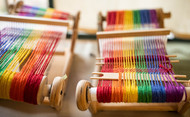While they’ve done an admirable job of keeping the textile industry alive in Harrisville, Haddock and the team at Friendly Loom and Harrisville Designs—still headed by John and Patricia Colony, some 52 years later—are even more encouraged by the future.
“We’re super psyched to have all these new crafters who have come to learn how to weave, to knit, to crochet, making potholders,” Haddock says. “In the last couple of years, at the New York Sheep and Wool Festival in Rhinebeck [New York], and I’ve noticed—more so than, say, even back in 2019—there’s been a huge increase in millennials and Gen Zs there, and they’re doing some really cool things.”
Friendly Loom is uniquely positioned to welcome new crafters into the hobby, and they’re working to expand their offerings to young makers, with craft kits in felting, needlepoint, weaving, and more classified by experience level, making it easy for beginners to work their way up through progressively more challenging projects.
It’s worth noting that all of Friendly Loom’s offerings are made in the same Harrisville workshop, bythe same artisans, as the company’s highest-end, professional-level equipment. Your Table Loom was made by the same people, from the same high-quality hard maple, as their giant $7,000 rug loom.
We take every piece seriously for the new crafters,” Haddock explains. “I think that’s really important, that we’re not making some stuff with plastic that’s going to break after one use. These are professional weavers, knitters, and builders who make little ‘toys,’ but they’re really not toys. They’re just a miniature version of the larger things that we make.”



